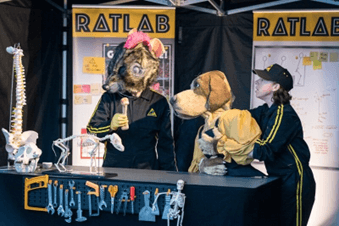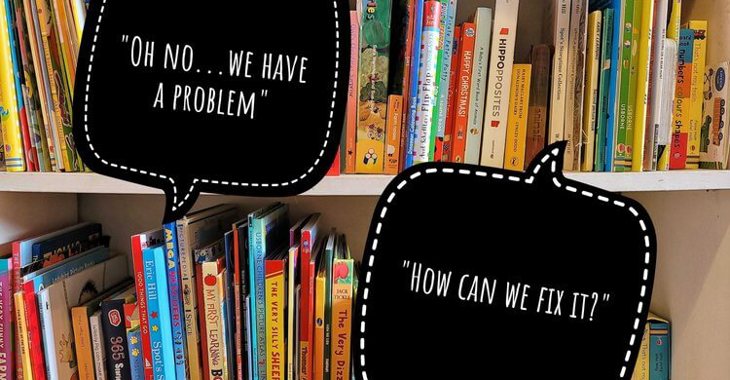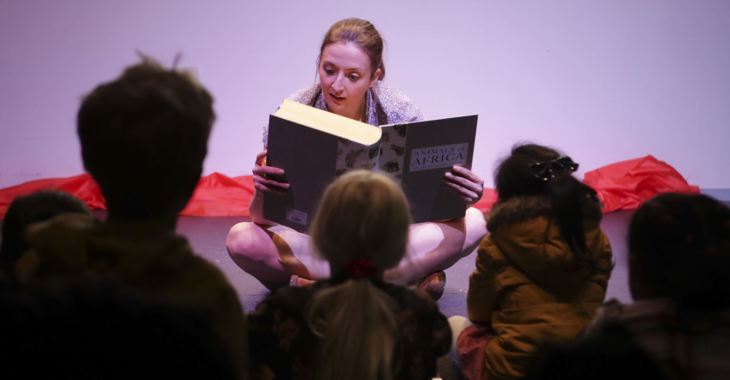RatLab: Engineering a biomechanics theatre show
Perfect machines: engineering a superhero was an Ingenious funded project that explored how human movement is underpinned by engineering principles, using imagination, creativity and puppets.
The project was a collaboration between the University of Bath and Green Ginger Ltd - a puppet theatre company based in Bristol. Together they co-produced an interactive performance aimed at KS2 primary school children to explore and how engineers design devices to repair the human body following injury.
The idea for Perfect Machines was born when Sabina Gheduzzi, Senior Lecturer in Mechanical Engineering at the University of Bath, visualised a unique way of teaching and engaging children about engineering and biomechanics. Originally Sabina had planned to use puppets to imitate movement and explain how engineering principles are central to movement. However, once Green Ginger came on board with the project, the original idea to use one small puppet exploded into a 20-minute interactive puppet show with a script and several different characters!

Creating a partnership
The direction of the project was monitored by an independent steering group comprising of KS2 teachers, parents and children, who were also consulted over the script and performance. The team also worked with a school liaison, to sign schools up to performances at an early stage of the project, and to ensure the right schools were targeted.
The project team wanted to target pupils from groups under-represented in higher education. To achieve this, a set of schools in the Southwest were selected based on the percentage of pupils eligible for the Deprivation Pupil Premium.
A total of 15 engineers, comprising of early career researchers and postgraduate research students from the University of Bath, worked on the project, taking part in training sessions before performances began to improve their public engagement skills. This consisted of a workshop for 12 engineers on puppetry, communication and public engagement and further
one-to-one training for the seven engineers tasked with taking part in the delivery phase of the performance. The one-to-one training was specifically targeted at communicating with young children and was delivered by the director of the show and proved fundamental to the success of the project.
Navigating theatre in a pandemic
The COVID-19 pandemic delayed project activities, which would originally have included performances of the show in schools in 2020. The project team overcame the challenges of the delay through adapting the delivery plan and acting swiftly when it became apparent that there would be an opportunity to work with schools at the very beginning of the 2021-22 academic year.
Set in an engineer’s pop-up laboratory, the show teaches the audience about movement and injury recovery, and the mechanics of how our bodies move. It was important for Sabina and the project steering group that the show contained no stereotypes related to engineering and decided to use animals for the characters of the show. The team created a fun story around a hip replacement and the rehabilitation of a pig called Veronica, with help from a dog called Sabina who loves bones and a team of rats, who run the RATLab!
The final piece consisted of a 20-minute performance followed by a 20 minute ‘meet the engineers’ question and answer session led by the engineers. To support learning and teaching, a series of teaching resources were developed by educators at the University of Bath. These comprised a booklet, some experiment instruction sheets and short videos.
Sabina enjoyed being a part of the theatre show, although it was unexpected, “When I was explaining (the vision) to Green Ginger, I didn’t realise I was part of the theatre project itself!” During the course of the project, Green Ginger delivered 25 performances, reaching a total of 597 school children, with an estimated 36.85% falling within the target population.
Three tips for a successful project
For Sabina, trusting in the work of the team and building personal relationships was essential to the success of the project. “I feel we really benefited from having a steering team, and we chose who we wanted to work with”.
A tip from Sabina for future projects who aim to work with schools is to plan early and approach the schools in the early stages of planning a project. “Having teachers on board allowed us to gain an insight on what would naturally fit within a primary school timetable”.
And amongst all the hard work and in-depth planning, for Sabina it was important to cherish the fun along the way, “Enjoy it! It was such a privilege to be part of this project”.
Legacy
Sabina and the project team are confident of more productions of RATLab in the future. “We believe we have a formula that works: RATLab captures the children’s imagination and promotes learning in a truly fun environment. We are hoping to capitalise on the success of this project by securing further funds to take RATLab to additional schools in 2022 and to develop similar performances focusing on different areas of engineering”.

Bedtime Stories for Very Young Engineers website
The project website is freely accessible and there are many more stories to come.

Ingenious public engagement grants scheme
Ingenious is a public engagement grants scheme for projects that engage the public with engineers and engineering while providing engineers with training and opportunities in public engagement. Clo…
